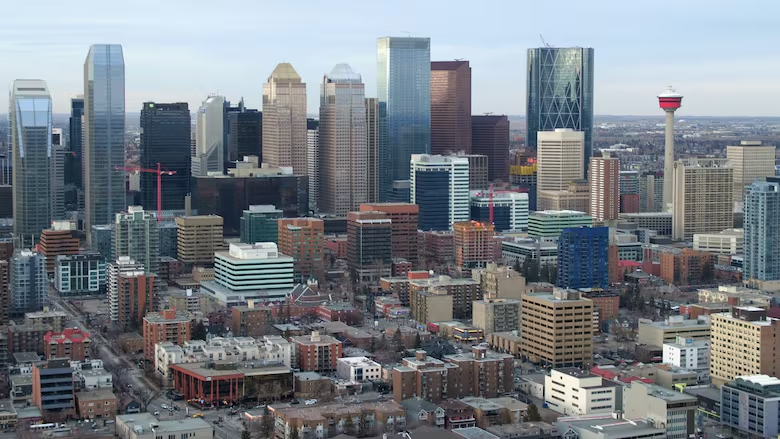When Calgary's skyline changed forever 50 years ago
Share your memory of the Calgary Tower in the comments below

It was 50 years ago that the Calgary Tower we know today started taking shape in downtown, changing our city's skyline for decades to come.
With construction materials of concrete and steel, pouring the base of the iconic building — formerly known as the Husky Tower — began on May 15, 1967. It was completed 24 days later.
- We want to see your photos of the Calgary Tower. Send them to calgaryphotos@cbc.ca, tweet to @CBCCalgary, post to our Facebook or tag @CBCCalgary on Instagram
The record pour was one completed in a 24-hour period and measured nearly 12 metres, according to the Calgary Tower's official records.


The tower officially opened to the public on June 30, 1968. There is planning underway for next June when the tower's 50th anniversary milestone will be celebrated.
Instantly recognizable from afar, the tower offers spectacular views of downtown, a restaurant and acts as a tourist magnet.
A large flame will erupt from time to time after a momentous occasion, like a Canadian winning an Olympic gold medal.
Designed by W.G. Milne, with A. Dale and Associates, it sits at the heart of downtown. It has dominated Calgary's skyline, but over the years has become less prominent as giant skyscrapers shoot up nearby.
The Bow building in downtown Calgary had been the tallest tower in recent memory, but it's been surpassed by Brookfield Place.


The original cost of the tower, owned by Husky Oil Limited and Marathon Realty, was $3.5 million in 1968.
It featured a 360-degree view of the city from both the restaurant, which boasts a revolving floor and seating for 200, and observation decks, which fit 250 sightseers.

There are two, steel-encased staircases with 762 steps from top-to-bottom, but two, 25-passenger high speed elevators, which travel to the top in 62 seconds, are the most common choice of transport.
The tower was designed to withstand elements, like high winds up to 161 km/h. On a windy day the tower can, and will, sway up to 16.5 centimetres.
Although Calgary is not an earthquake zone, it was the first building in the western provinces designed to withstand one.


There are three lights on the roof: 12 on the crown, 96 on the ring and 24 each on the upper and lower pods.
Each fixture has a unique IP address that can be programmed individually to produce over 16.5 million colours and lighting effects. The project took six weeks for installation and two weeks for testing.
The tower now projects those many lights throughout the year to mark occasions of great importance or tragedy.

Now known as Sky 360, the revolving restaurant has seen many tourists and locals alike over the years. Here's how much they served in 2016:
- Around 96,000 guests.
- Around 11,000 bottles of wine.
- About 27,000 steaks.
- More than 2,000 birthday or anniversary parties last year (that the restaurant was notified of).
- Roughly 30 proposals (that the restaurant was notified of).







- MORE CALGARY | How 'disgraceful' naked Brotherhood of Mankind statues became a Calgary icon
- FOOD AND THE CITY | Making cannoli runs in the family
Information provided by the Calgary Tower
